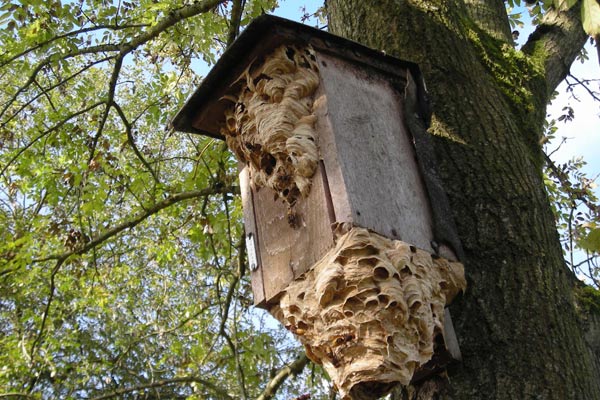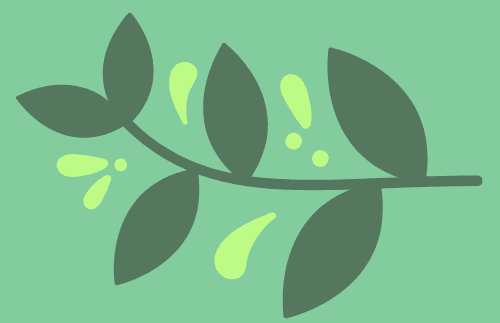Last updated on October 23rd, 2023 at 08:30 pm
“Three hornets kill a man, seven a horse”. The phrase is still often used today – but it is completely refuted. Hornets are not more dangerous than normal wasps, and on the contrary, even peaceful and shy insects. They are also not interested in your food and can even be useful helpers in the garden. We have the most important info and tips for dealing with hornets or a hornet nest.
Hornets (Latin: vespa crabro) belong to the wasp family. They also form a state, which the hornet queen establishes in spring. In midsummer, the colony reaches the maximum size of about 400 to a maximum of 1000 members, workers and drones. For this purpose the queen starts building a nest. The base is usually wood fibers, obtained from rotten wood scraps.
Contents
- 1 Hornet nest – location for only one summer
- 2 Only the queens survive the winter
- 3 Peak of the hornet’s nest in late summer
- 4 Where do hornets overwinter?
- 5 Passive and rather shy insects
- 6 Hornets eat flies and wasps
- 7 Light sources attract hornets at night
- 8 Tips for dealing with hornets
- 9 Sting no more dangerous than wasp sting
- 10 Author
Hornet nest – location for only one summer

Since hollow tree trunks are becoming increasingly rare as places to build nests, hornets now also like to use nesting boxes for birds, woodsheds, attics or wooden sheds around people.
Only the queens survive the winter
Like wasps, hornets do not survive the winter except for the newly hatched queens in late summer. In October, November at the latest, the last worker bees die. Only the fertilized young queens overwinter with the aim of founding a new state the following year.
To do this, they look for another place in the spring. So, if you have a hornet nest in your garden, it will die out in the fall and the queens will look for a new place to establish their state next year.
Hornets are also able to change locations and relocate during the summer, so a nest can still be established in July or August. This happens mainly when the old nest site becomes too small as the state grows.
Peak of the hornet’s nest in late summer
Especially in late summer and early autumn hornets are often found. The state then reaches its maximum expression before the old queen is no longer supported and her colony dies out except for the young queens. Also, the nests now reach the largest dimensions, up to 60 centimeters in height.
Where do hornets overwinter?
The young queens and the drones swarm out to mate. The males survive only a few weeks, while the queens look for a suitable place to overwinter. This can be, for example, the rotten wood of a tree or soil.
Passive and rather shy insects
Compared to some other wasp species, hornets are clearly shyer and intrinsically peaceful animals. They avoid people and especially their food and drinks. Especially desserts and meat – the real attraction for wasps on your terrace or in the garden – do not interest hornets.
On the other hand, these insects love ripe fruit, such as grapes or plums. If you have fruit trees or vines in your garden, you should therefore be careful when harvesting in summer and autumn and pick up fallen fruit in good time.
Hornets eat flies and wasps
Hornets feed on sap from tree wounds, for example, they are very fond of nibbling the soft bark of lilac or summer lilac to get the nutrient-rich nectar. Don’t worry in this case: the plants will not be harmed by this and will bloom again the next year.
Besides, for their offspring they catch mainly other insects, such as flies, bees or even – wasps. In this respect, hornets even prove to be useful garden inhabitants, because they decimate the annoying conspecifics. Especially when wasps seem to become a plague in summer, hornets can intervene effectively.
Light sources attract hornets at night
Another peculiarity of hornets is that they are nocturnal. They then prefer to fly to light sources and sometimes cannot get away from them. So, with appropriate garden lighting, you may make acquaintance with them on summer nights. Tip: Extinguish the light source until the hornet flies on. If an animal has flown into the house because of the light, it is best to catch it with a glass, put it over it, slide a leaf under the glass and bring the animal back outside.
Tips for dealing with hornets
First and foremost, one should avoid violent movements with hornets as with wasps. Staying calm is a safe strategy here. Also, do not stay in close proximity to the nest or permanently cross the flight paths to the nest. If the hornet nest is located so inconveniently in your yard, you should get professional help for relocation. However, this requires a special permit from the nature conservation authority.
Sting no more dangerous than wasp sting
Contrary to all rumors, the sting of a hornet is not more dangerous than a wasp or bee sting, but they are perceived as more painful. In the case of an acute hornet sting, it is best to remove the stinger immediately and cool the area so that the swelling can subside quickly.
As with bee and wasp stings, there is a danger for allergy sufferers, who should consult a doctor if they are stung. Likewise, stings in the mouth and throat are serious, you should also seek medical help.


